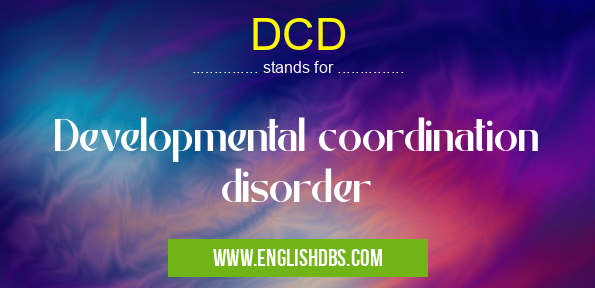What does DCD mean in SYNDROMES
DCD, or Developmental Coordination Disorder, is a neurological condition that affects a person's coordination, motor skills, and balance. It is a developmental disorder, meaning it usually begins in childhood and can persist into adulthood. DCD can range in severity, with some individuals experiencing mild difficulties, while others may have more significant impairments.

DCD meaning in Syndromes in Medical
DCD mostly used in an acronym Syndromes in Category Medical that means Developmental coordination disorder
Shorthand: DCD,
Full Form: Developmental coordination disorder
For more information of "Developmental coordination disorder", see the section below.
Introduction: Understanding Developmental Coordination Disorder (DCD)
Causes and Symptoms of DCD
The exact cause of DCD is not fully understood, but it is believed to involve a combination of genetic, environmental, and neurological factors. Symptoms of DCD can vary widely, but common signs include:
- Clumsiness and difficulty with fine motor skills
- Difficulty with coordination and balance
- Poor handwriting and difficulty with buttoning or tying shoelaces
- Difficulty with sports and physical activities
- Poor sense of spatial awareness
- Fatigue and difficulty with sustained attention
Impact of DCD
DCD can have a significant impact on an individual's life. Children with DCD may experience:
- Academic difficulties due to poor handwriting and coordination
- Social problems due to difficulties participating in activities and forming relationships
- Low self-esteem and anxiety
- Increased risk of accidents and injuries
Assessment and Diagnosis of DCD
Diagnosing DCD involves a comprehensive evaluation by a healthcare professional, usually a pediatrician or neurologist. They will assess the individual's coordination, motor skills, and balance, as well as their developmental history and other factors.
Treatment and Intervention for DCD
There is no cure for DCD, but early intervention and support can significantly improve symptoms and outcomes. Treatment typically involves:
- Occupational therapy to improve coordination and motor skills
- Physical therapy to enhance balance and gross motor skills
- Sensory integration therapy to address sensory processing issues
- Education and support for the individual and their family
Final Words: DCD is a complex condition that can affect an individual's coordination, motor skills, and balance. Early diagnosis and intervention are crucial for improving symptoms and supporting individuals with DCD to reach their full potential. Ongoing support, understanding, and accommodations can help individuals with DCD live fulfilling and active lives.
DCD also stands for: |
|
| All stands for DCD |
